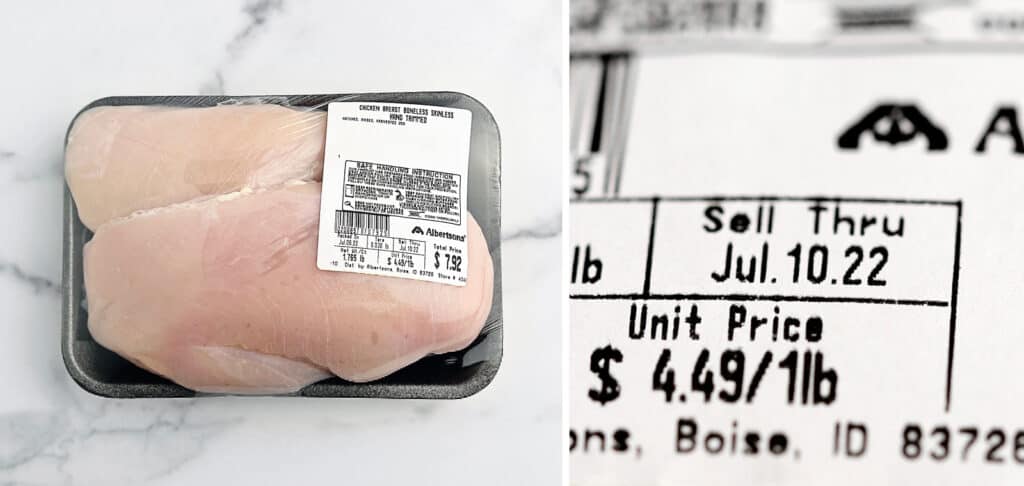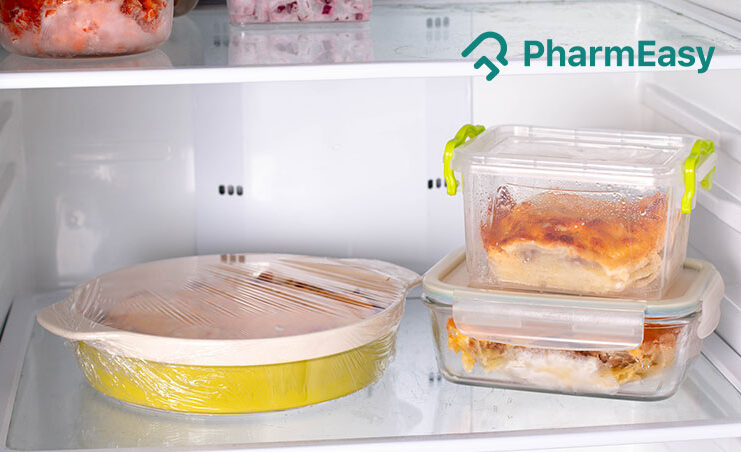Introduction: Understanding Chicken Use Or Freeze By Date

Understanding the concept of Chicken Use or Freeze By Date is crucial for ensuring food safety. This date indicates the recommended time frame within which the chicken should either be used or frozen to maintain its quality and safety. It is important for consumers to understand the meaning behind different terms on the packaging and to follow the guidelines provided. This blog section will provide valuable information on the general guidelines, factors influencing shelf life, freezing methods, safe handling, and frequently asked questions regarding Chicken Use or Freeze By Date.
What Is The Use Or Freeze By Date For Chicken?
The Use or Freeze By Date for chicken refers to the recommended time frame within which chicken should either be used or frozen to maintain its quality and safety. This date is typically indicated on the packaging and serves as a guideline for consumers. It is important to understand that this date is not an expiration date but rather a suggestion for optimal freshness. Following the Use or Freeze By Date helps ensure that the chicken is consumed or frozen before it becomes unsafe to eat.
Importance Of Following Food Safety Guidelines For Chicken
Following food safety guidelines for chicken is crucial to ensure the health and safety of consumers. The Use or Freeze By Date serves as a helpful guideline for determining the freshness and quality of chicken. Adhering to these guidelines helps to prevent foodborne illnesses caused by consuming spoiled or contaminated chicken. Proper storage, handling, and cooking techniques are essential to minimize the risk of bacterial growth and cross-contamination. By following food safety guidelines, individuals can enjoy chicken dishes without compromising their health and well-being.
General Guidelines For Chicken Use Or Freeze By Date

To ensure the safety and quality of chicken, it is important to follow general guidelines for the Use or Freeze By Date. Here are some key points to keep in mind:
- Understanding the meaning of different terms on the packaging: The Use or Freeze By Date indicates the date by which the chicken should be consumed or frozen for optimal freshness.
- How long can you safely keep chicken in the refrigerator: It is recommended to use or freeze the chicken within 1-2 days of the Use or Freeze By Date to prevent bacterial growth and maintain quality.
By following these guidelines, individuals can make informed decisions about the freshness and storage of their chicken to ensure food safety.
Understanding The Meaning Of Different Terms On The Packaging
Understanding the meaning of different terms on the packaging is crucial for consumers to make informed decisions about the freshness and safety of chicken. The Use or Freeze By Date indicates the date by which the chicken should be consumed or frozen for optimal freshness. This date is typically based on food safety regulations and guidelines. It is important to pay attention to this date and follow it to ensure the quality and safety of the chicken. By understanding and adhering to these packaging terms, consumers can confidently determine the shelf life of the chicken and avoid any potential risks of consuming spoiled or unsafe chicken.
How Long Can You Safely Keep Chicken In The Refrigerator?
Chicken can be safely stored in the refrigerator for a limited period of time. It is recommended to use or freeze chicken within 1-2 days of the Use or Freeze By Date mentioned on the packaging. Keeping chicken in the refrigerator beyond this time can increase the risk of bacterial growth and spoilage. To ensure food safety, it is important to follow this guideline and consume or freeze chicken within the recommended timeframe. Proper storage and refrigeration temperatures (below 40°F or 4°C) are essential for maintaining the quality and safety of chicken.
Factors Influencing Chicken Shelf Life

There are several factors that can influence the shelf life of chicken. One important factor is the initial quality and freshness of the chicken. High-quality chicken that is fresh will have a longer shelf life compared to chicken that is nearing its expiration date. Proper storage conditions also play a crucial role. Chicken should be stored at or below 40°F (4°C) to prevent bacterial growth. Additionally, how the chicken is handled and prepared can impact its shelf life. Following safe handling practices, such as washing hands and properly storing leftovers, can help maintain chicken’s freshness and safety for a longer period of time.
Proper Storage Conditions For Maintaining Chicken Quality
Proper storage conditions are essential for maintaining the quality of chicken. To ensure the freshness and safety of chicken, it should be stored at or below 40°F (4°C). This temperature helps to slow down bacterial growth and prevents spoilage. It is important to store chicken in the coldest part of the refrigerator, away from other foods to prevent cross-contamination. Chicken should be stored in sealed containers or wrapped tightly in plastic wrap or foil to minimize exposure to air and prevent drying out. By following these storage conditions, the quality and shelf life of chicken can be extended.
Signs Of Spoilage To Look Out For In Chicken
Signs of spoilage in chicken can include changes in appearance, odor, and texture. If the chicken has developed a slimy or sticky texture, it is likely spoiled. Additionally, if it has a foul or off smell, it should not be consumed. Discoloration, such as patches of gray or green, can also indicate spoilage. It is important to inspect the chicken thoroughly before cooking or consuming it to ensure it is safe to eat. If in doubt, it is best to discard the chicken to avoid the risk of food poisoning.
Freezing Chicken For Extended Storage

Freezing chicken is an effective way to extend its storage life. To properly freeze chicken, it is recommended to place it in airtight containers or freezer bags to prevent freezer burn. Label the containers with the date to keep track of how long the chicken has been frozen. It is best to freeze chicken as soon as possible after purchasing or cooking it. When storing frozen chicken, it is important to keep it at a constant temperature of 0°F or below. Frozen chicken can be safely stored for up to nine months, although the quality may start to diminish after six months.
Steps To Properly Freeze Chicken
To properly freeze chicken, follow these steps:
- Remove the chicken from its original packaging and place it in airtight containers or freezer bags.
- Press out as much air as possible before sealing the bags to prevent freezer burn.
- Label the containers or bags with the current date to keep track of storage time.
- Place the sealed containers or bags in the freezer, making sure they are stored in a single layer for quicker freezing.
- Keep the freezer temperature at 0°F or below to maintain the quality and safety of the frozen chicken.
Properly freezing chicken helps to preserve its freshness and flavor for an extended period.
Recommended Storage Duration For Frozen Chicken
Frozen chicken can be safely stored in the freezer for an extended period. For best quality, it is recommended to use frozen chicken within 9 months to maintain its taste and texture. Beyond this recommended timeframe, the chicken may still be safe to eat, but the quality may not be as optimal. It is important to check for signs of freezer burn or any changes in color or texture before consuming frozen chicken that has been stored for a longer period.
Safe Handling And Preparation Of Chicken

Safe handling and preparation of chicken is crucial to ensure food safety. When handling raw chicken, it is important to wash hands thoroughly before and after touching it to prevent cross-contamination. Additionally, use separate cutting boards and utensils for raw chicken to avoid contaminating other foods. Cooking chicken to the correct internal temperature is essential – it should reach 165°F (75°C) to ensure any harmful bacteria are killed. Following these safe handling and preparation practices will help reduce the risk of foodborne illnesses caused by chicken consumption.
Keywords: safe handling, preparation, chicken, food safety, cross-contamination, cooking temperature, foodborne illnesses.
Importance Of Cooking Chicken To The Correct Internal Temperature
Cooking chicken to the correct internal temperature is crucial for ensuring food safety. The ideal cooking temperature for chicken is 165°F (74°C). This temperature ensures that any harmful bacteria present in the chicken are killed, reducing the risk of foodborne illnesses. Consuming undercooked chicken can lead to salmonella or other bacterial infections. Therefore, it is important to use a meat thermometer to accurately measure the internal temperature of the chicken before consuming it. By cooking chicken to the correct internal temperature, you are taking necessary precautions to protect your health.
Tips For Preventing Cross-contamination During Chicken Preparation
- Always wash your hands with soap and warm water before and after handling raw chicken.
- Use separate cutting boards and utensils for raw chicken to avoid cross-contamination with other foods.
- Clean and sanitize countertops, knives, and other surfaces that come into contact with raw chicken.
- Avoid using the same plates or utensils for raw and cooked chicken to prevent the spread of harmful bacteria.
- Keep raw chicken away from ready-to-eat foods to prevent them from becoming contaminated.
- Cook chicken thoroughly to the correct internal temperature to ensure any bacteria are killed.
Frequently Asked Questions about Chicken Use or Freeze By Date
Q: What does “use by” or “freeze by” date mean?
A: The “use by” or “freeze by” date refers to the last day recommended for consuming or freezing fresh chicken to ensure its quality and safety.
Q: Is it safe to consume chicken after the “use by” date has passed?
A: It is not recommended to consume chicken after the “use by” date has passed, as it may no longer be safe to eat due to potential bacterial growth.
Q: Can I freeze chicken after the “use by” date?
A: It is best to freeze chicken before the “use by” date to maintain its quality and taste. Freezing chicken after the date has passed may affect its texture and flavor.
Q: How long is chicken good for in the freezer?
A: Chicken can be safely stored in the freezer for up to 9-12 months. It is important to keep chicken properly wrapped or sealed to prevent freezer burn and maintain its quality.
Q: Can I rely solely on the “use by” date when determining if chicken is still safe to eat?
A: While the “use by” date provides a general guideline, it is essential to check the chicken’s appearance, smell, and texture. If the chicken appears questionable in any way, it is best to discard it.
Q: How can I determine if chicken has gone bad?
A: Signs of spoiled chicken may include an unpleasant odor, slimy texture, or off-color. If you detect any of these signs, it is safest to dispose of the chicken.
Q: What if the “use by” date has not passed, but the chicken doesn’t look or smell right?
A: Trust your senses. If the chicken appears or smells off despite the date not being expired, it’s better to err on the side of caution and discard it to avoid the risk of foodborne illness.
Q: Can I extend the “use by” date by freezing chicken?
A: Freezing chicken prior to the “use by” date can help extend its shelf life by several months, preserving its quality and freshness when thawed and cooked properly.
Q: Can I refreeze chicken that has been thawed?
A: It is generally safe to refreeze chicken that has been thawed but has not been cooked. However, each time you refreeze, the quality may deteriorate slightly.
Q: How should I store chicken in the refrigerator?
A: Chicken should be stored in the coldest part of your refrigerator, ideally at or below 40°F (4°C). Keep it wrapped securely or in a sealed container to prevent cross-contamination and maintain freshness.
It is important to note that the guidelines and recommendations provided above are based on general food safety practices. Always follow the recommendations provided by the chicken producer and trust your senses when assessing the quality and safety of any food product.

From At-Home Dinner Parties to Family Reunions to Office Parties, we can cater your next Event!